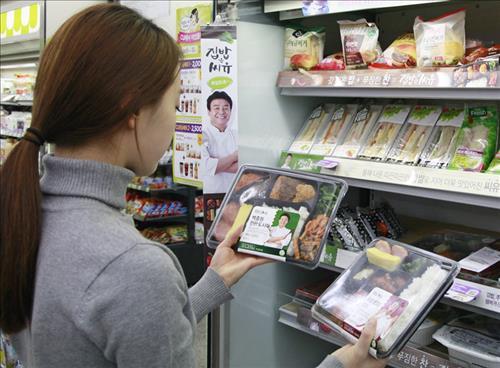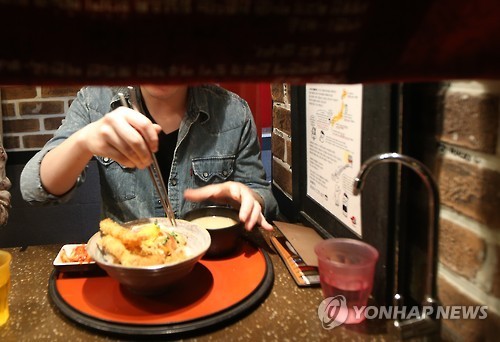For Jang Hee-seok, a 33-year-old Seoulite, visiting a convenience store near his office during lunch hour is an almost daily routine. He goes there to get his lunch, packed in a box. Out of some 30 choices, the popular options include rice with chicken breast, deep-fried pork cutlet or fried kimchi rice. His favorite is bulgogi stir-fried with gochujang, the Korean red pepper paste.
He returns to his office, microwaves his food and eats it alone at his desk. Sometimes he also has cup noodles to go with it. A convenience store boxed lunch costs about 4,000 won ($3.39). It takes him 15 minutes to finish his lunch. And all this is when he eats lunch at all -- the busy man that he is, he often skips the meal just to concentrate on his work.
“I don’t really feel like spending more than 5,000 won on lunch, because I’m eating it alone anyway,” he told The Korea Herald.
“It makes more sense to have quality food when you have someone to share it with.”
He returns to his office, microwaves his food and eats it alone at his desk. Sometimes he also has cup noodles to go with it. A convenience store boxed lunch costs about 4,000 won ($3.39). It takes him 15 minutes to finish his lunch. And all this is when he eats lunch at all -- the busy man that he is, he often skips the meal just to concentrate on his work.
“I don’t really feel like spending more than 5,000 won on lunch, because I’m eating it alone anyway,” he told The Korea Herald.
“It makes more sense to have quality food when you have someone to share it with.”

Jang is one of the growing number of South Koreans who eat alone at work and home. From 2010-2015, the proportion of single-person households increased significantly from 15.8 percent to 27.1 percent. According to a report by the Health Ministry, 55 percent of all Koreans aged 19-64 did not have dinner with their families as of 2014. One of the reasons behind the statistics is the nation’s notoriously long work hours -- one of the longest among the developed nations.
A recent study by the Korea Health Promotion Foundation found that a large number of working Koreans aged 30-59 who eat alone do so because they want to save time or simply do not have anyone to eat with. Among the surveyed Koreans in their 30s, 38.7 percent of them said they eat alone because they do not have company during meal times. Meanwhile, 21.5 percent said they just did not have enough time to eat with someone else. Another 16.1 percent said they ate alone to save time.
In Jang’s case, it is a combination of both. His office only has two people, including himself, and his coworker often skips lunch because he wants to lose weight. Jang said, “Since I’m usually too busy with work before and after lunch, I don’t really want to make lunch plans – I don’t want to rush while eating with someone else,” he said.
There is a reason why Jang prefers boxed meals over dining alone at restaurants. He said he gets self-conscious when he eats alone in public, thinking others may judge him or think he is a “social outcast.” He often plays with his smartphone while eating at restaurants, in an attempt to “look very busy” rather than to appear as someone with no close friends or colleagues. “I think there still this public notion that if you are eating alone, there must be something wrong with your social life,” he said.
The unwelcoming attitude shown by servers or restaurant owners is also a factor. There were a number of times where he felt unwelcome during busy hours as he was occupying a table which was for three or four people, he said.
“By taking a lone-diner like me, they are losing two or three more customers,” Jang said. “I understand where they are coming from, so I don’t feel upset or anything. But it does definitely make me feel hesitant about dining alone at restaurants.”

Besides lunch, Jang also eats breakfast alone.
His breakfast usually consists of steamed rice and one or two Korean side dishes that can “last a long time in the fridge,” such as pickled vegetables with little nutritional value. It is rare for him to eat dinner by himself as he usually makes plans to socialize. However, when he does, the meal usually consists of simple take-out snacks from small restaurants, such as dumplings and gimbap. “I don’t think my diet is necessarily healthy,” he said.
Overseas studies have shown that dining alone can be either good and bad for one’s health. A 2014 study by the Journal of Academy of Nutrition and Dietetics in the U.S. found that eating behaviors can be “easily transmitted socially.” The study claimed that individuals who are surrounded by people who prefer high-calorie food are more likely to consume such food than solo eaters with healthy eating habits.
Meanwhile, a 2013 study by the European Prospective Investigation of Cancer found that the “lonely nature” of solo dining can negatively affect individuals aged 40 or older. Researchers also found that elderly solo diners tend to consume fewer vegetables than those who eat as a couple, making them vulnerable to chronic health conditions such as diabetes.
Among the Koreans who participated in the survey by the KHPF, 45.8 percent said they do not eat properly when eating alone, while 19.1 percent said they opt for fast food, such as hamburgers, when they have no one to eat with. At the same time, 15.3 percent said they tended to eat fast when eating by themselves, and 7.8 percent said they did not enjoy the food when eating without a companion, as they have no one to talk to.
“It’s no fun to eat by yourself,” Jang said. “Having lunch or dinner is not just about finishing your food. It’s a social activity – it’s all about sharing your food as well as your ideas and stories with others.”
Yet South Korea has welcomed a number of restaurants that specifically cater to solo diners in recent years, some of which offer cubicle seats so guests don’t have to worry about the empty seat on the other side of the table.
Shim Kwon-ho, a 31-year-old office worker in Seoul, said there is nothing wrong with doing activities alone – such as dining and going to concerts – and those who do it should be able to do so without having to worry about being judged.
A frequent solo diner who also enjoys going to movies by himself, Shim said the biggest implication of the solo dining culture -- “honbap culture” in Korean -- is the word itself.
“Why do we even need a separate, special word such as ‘honbap’ for those eating alone, while there isn’t a specific term for those who dine with others?” he said.
“The very fact that people often think less of someone just because he or she is seen eating alone indicates the shared prejudice against those without the necessities defined by society, such as a girlfriend and friends.”
By Claire Lee(dyc@heraldcorp.com)
Names of the sources have been changed upon request. – Ed.


















![[Today’s K-pop] Treasure to publish magazine for debut anniversary](http://res.heraldm.com/phpwas/restmb_idxmake.php?idx=642&simg=/content/image/2024/07/26/20240726050551_0.jpg&u=)